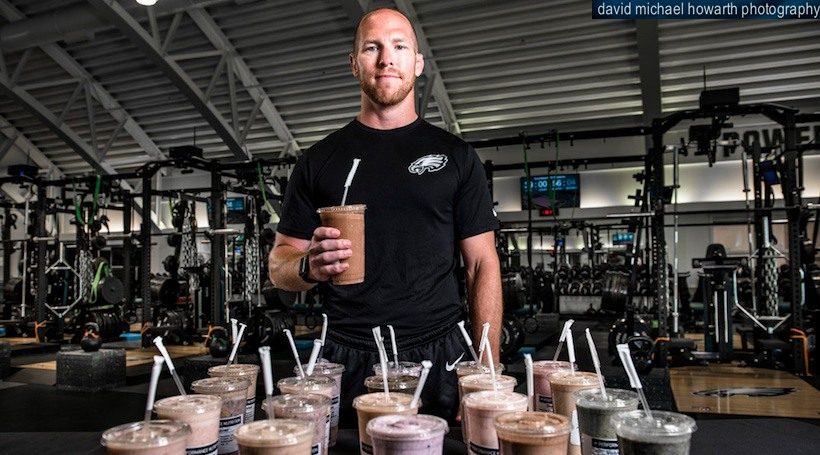In another day and age in the NFL, players would end a grueling practice with a recommendation to rest, take it easy and maybe find a way to soothe some aching muscles. But today, a new reliance on scientific data dictates a whole other plan of action, one that focuses on strengthening and refueling.
Sports science – used for decades in individual sports but new to team sports – uses specific data and targeted technology to improve player stamina and performance. Today’s technology allows teams like the Eagles to glean as much player-specific information as possible. And they can collect that data using devices like a GPS monitor implanted in practice jerseys to measure effort output, sweat production and body temperature.
The Eagles sports science team, which encompasses the team’s athletic training staff and the strength department, is led by Shaun Huls, who was brought on to lead this effort as part of former head coach Chip Kelly’s staff in 2013. Huls was initially named head strength and conditioning coach for the Eagles after serving as combatives coordinator for Naval Special Warfare. In that post, Huls coordinated the strength and conditioning, and injury prevention programs for the Navy SEAL Teams.
One of the core principles Huls has introduced for the Eagles is an emphasis on hydration and proper nutrition.
“It’s important to get the players replenished as quickly as possible to help them recover and continue to perform at a high level,” says Huls.
“The faster you can get good food into your body, the faster your muscles recover. In the NFL, you have to be at your best every single day. Eating right, staying hydrated and understanding your body and how it recovers is something that we think aids players in their careers.”
The new philosophy is the direct opposite of the NFL of yesteryear. You’ve seen the old-time movies with coaches deriding players who reached for a bottle of water, questioning the manhood of players who wanted a break to hydrate. It just wasn’t the way business was done in the NFL 20 or 30 years ago. In addition, players were given freedom to eat as they wanted, so many had too much junk food in their daily diets.
The Eagles now want players to continually fuel the body, since they are in constant motion and burning so much energy. In fact, the team conducted a study in 2013 on calories burned by offensive linemen and found that, on average, each player burned around 2,000 calories at one practice. So offensive linemen now consume between 3,500 and 6,000 calories per day, depending on the individual.
In addition, as players walk back to the locker room after each practice, they pass a food station loaded with protein drinks, quick bites of food like chips, hummus and avocado dip, and energy shakes formulated and made on the spot with specific ingredients – greens and proteins – according to a player’s position on the team. And that’s not mentioning the water and Gatorade brought in by the truckload.
“If you can plan your meals throughout the day and have small, deliberate portions of food, your body can effectively utilize those calories. With the amount of activity the guys are going through right now, you definitely see more food in the building,” Huls says. “You don’t want to have a negative balance of energy. By eating the right way and eating the right foods, that balance of energy remains positive.”
“It used to be that players would come into training camp purposely heavy because they knew they were going to lose weight. That’s not the case any longer. We don’t want to break players down. We want them to maintain and even to grow and recover quickly.”
These days, the guidelines for proper hydration are very clear: A 300-pound football player needs to drink half his body weight in fluids – a mix of water and electrolytes – as a baseline, meaning he must drink 150 ounces daily, and then add 16 to 32 ounces of fluids for each hour of working out.
Players today are seen leaving the NovaCare Complex after a long day of work carrying with them bags of bottled water and Gatorade for evening and overnight consumption.
“Your performance is directly impacted negatively by dehydration,” Huls says, “and we want to help the players stay hydrated with reminders to drink water and to consume Gatorade not just when they are working out, but all the time. As little as
2 percent of your body’s fluid being lost can easily happen in a practice. And when that happens, studies have shown, a player can lose up to 10 percent of his cognitive performance.”
Players are also encouraged to commit to a good night’s sleep – 9 hours and 15 minutes is the suggested optimal amount. Huls says sleep is directly linked to performance.
While Kelly’s head-coaching tenure with the Eagles lasted only three seasons, his introduction to a new way of doing things, of keeping options open and considering all options, remains. The players are free to accept or reject the information provided to them as far as their nutrition and hydration levels, and the new methods of training and conditioning that are introduced each year.
Some players stick to what has worked for them throughout their football careers, insisting they know what is best for their bodies. Others embrace the out-of-the-box ideas to keep them on the field for as many seasons as possible.
“I think it’s been beneficial for me,” says safety Malcolm Jenkins, who has started all 48 games in his three seasons as an Eagle after never starting more than 15 in a single season in his previous five years with the New Orleans Saints.
“I’m open-minded to accepting that there are different ways to improve on and off the field. I paid attention to it when I got here. I’ve used some of what I’ve learned, and I’m eating better, getting more sleep and taking better care of my body. I think it’s helped my career.”
5 Ways to Get In Shape Like an Eagle
Want to train like the pros? Josh Hingst, Eagles Head Strength Coach, says this is what you need:
- Good sleep, and that means quantity and quality. Aim for 7 to 8 hours per night in a cool room that is completely dark with limited ambient noise.
- Frequent exercise that encompasses both strength training and cardiovascular training.
- A high-variety diet comprised mostly from whole food sources such as fresh fruits, vegetables and lean proteins.
- A healthy hydration level with frequent water consumption.
- A regular time every day for mental and emotional recovery. Schedule it.
Drink Up, Fuel Up
Eagles Performance Nutrition Coordinator Michael Minnis prepares this triple berry smoothie for players to have after practice. He suggests they drink this before eating anything:
8 oz. 2% Milk
4 oz. Water
1/2 cup Strawberries
1/2 cup Blueberries
1/2 cup Raspberries
1 scoop Vanilla Whey Isolate Protein














